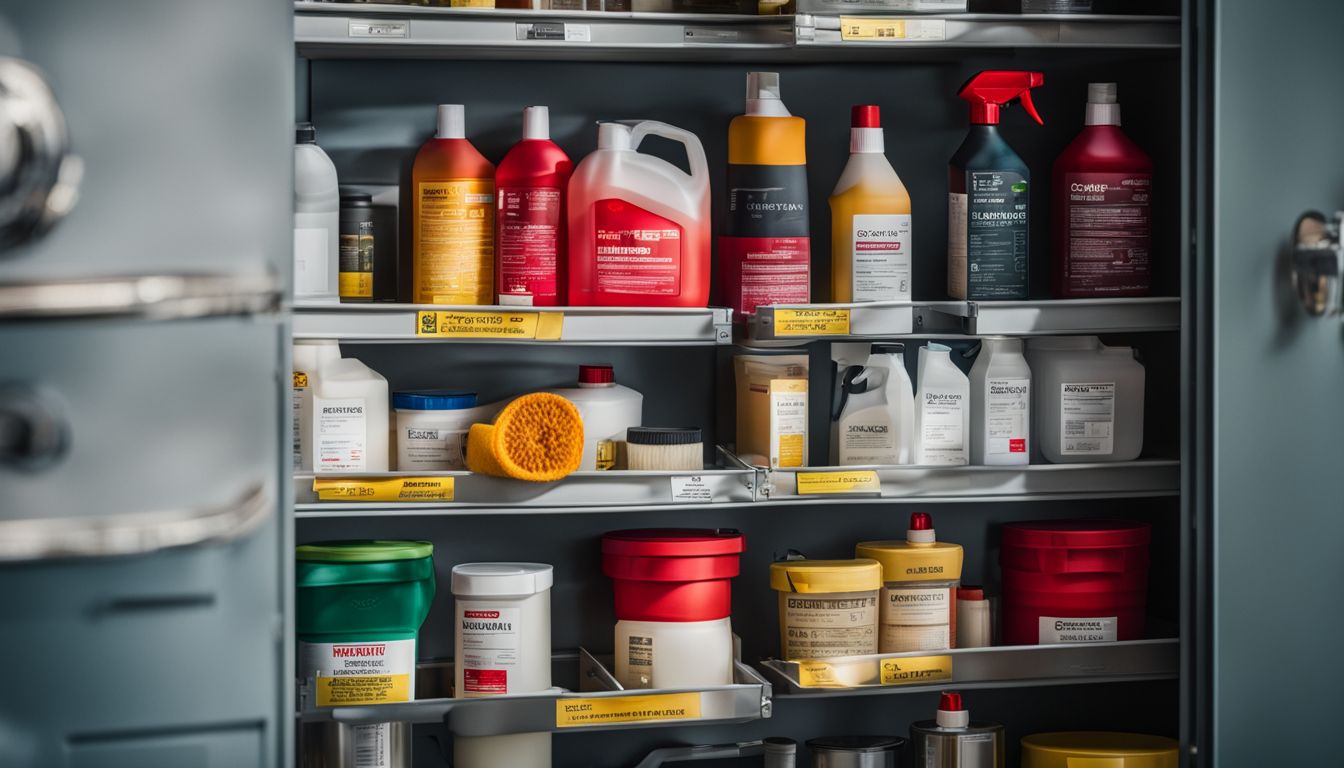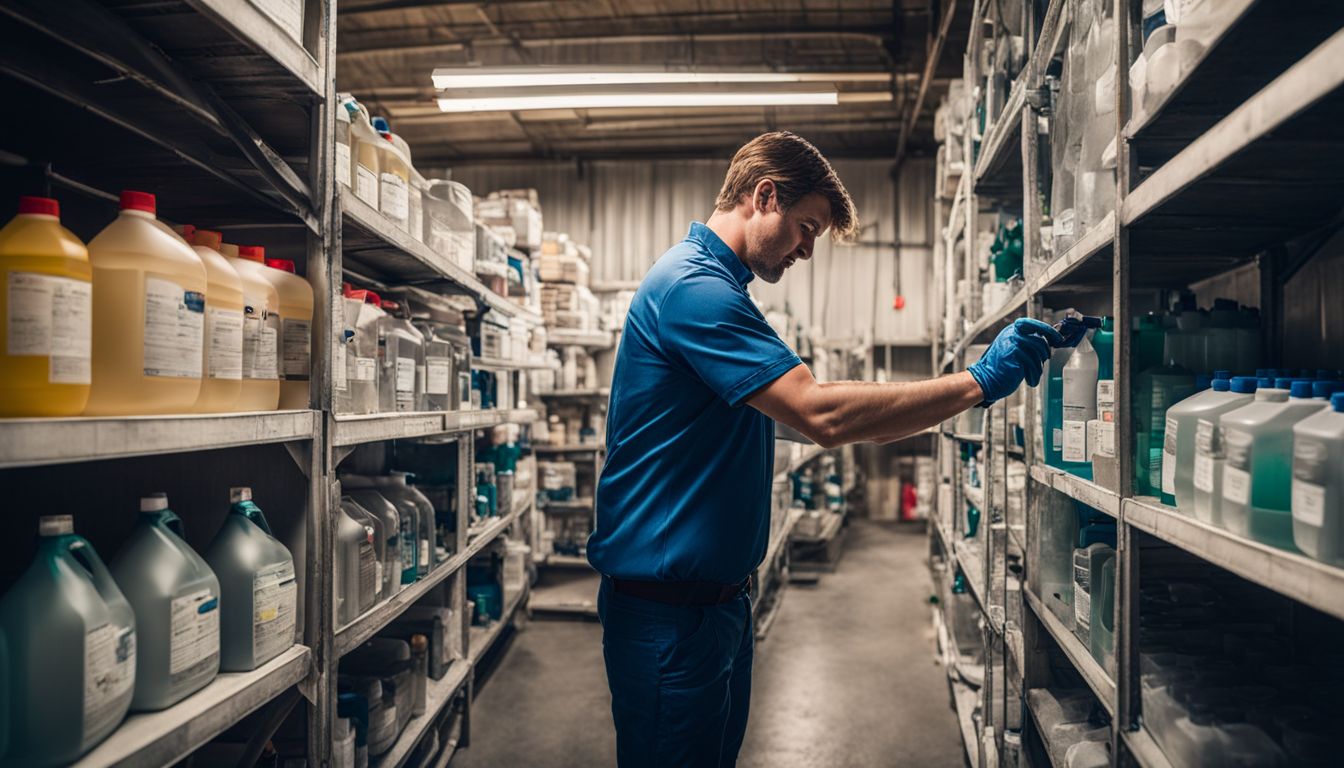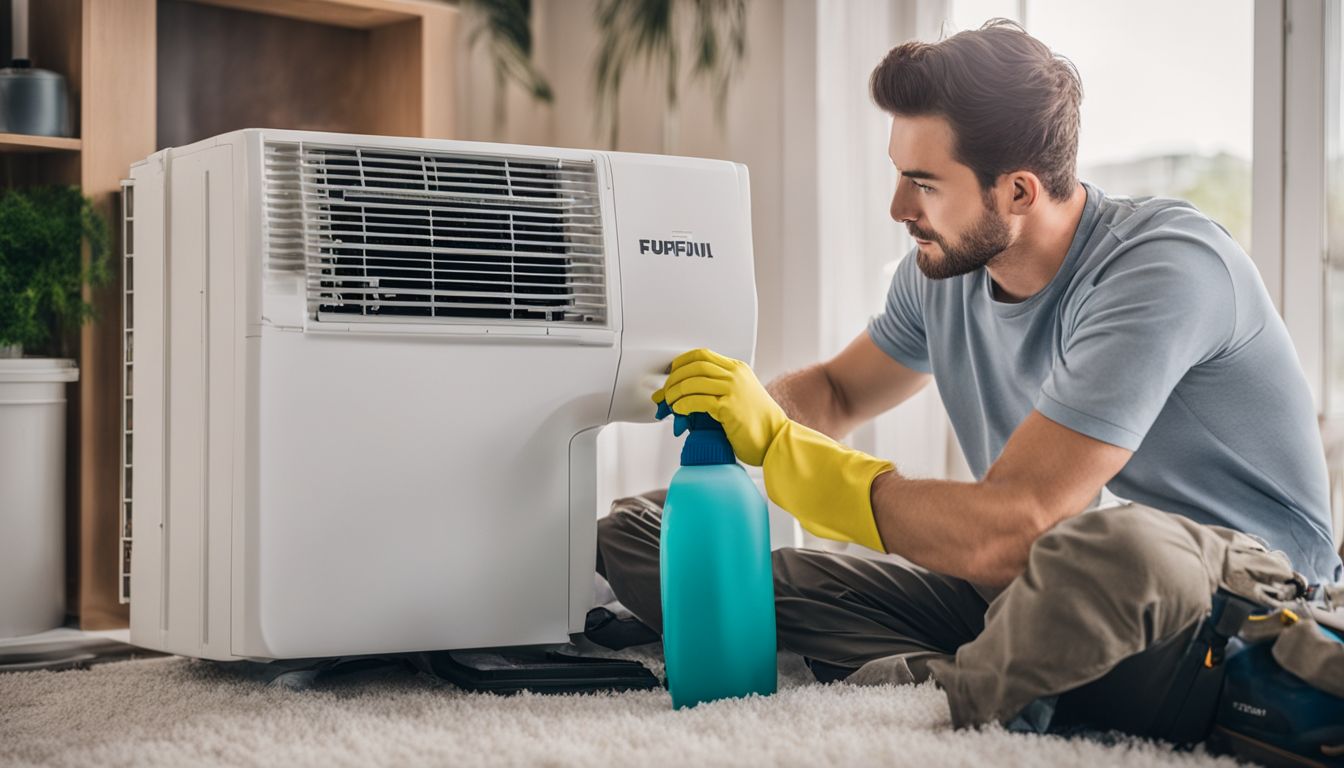Are you struggling to keep your chemical wash effective for longer? Proper use and storage of cleaning chemicals are key. We’ll show you simple steps to extend the effectiveness of your chemical wash, making your equipment last longer and work better.
Read on for easy-to-follow tips!
Proper Storage of Cleaning Chemicals
Storing your cleaning chemicals in a secure, cool and dry spot ensures they maintain their effectiveness. Keeping them away from direct sunlight helps avoid degradation and extends their lifespan.
Secure, cool, and dry place

Choosing the right storage for your cleaning chemicals ensures their effectiveness and safety. Place them in a clean, cool, and dry area to prevent the risk of hazardous reactions.
This practice is crucial, especially when dealing with corrosive materials like caustic soda or sodium hydroxide used in aircon servicing. Ensure these substances are kept away from direct sunlight to avoid degradation or dangerous temperature increases.
Locking away your cleaning agents secures them against unauthorised access, safeguarding everyone involved from potential injury. Containers should be clearly labelled and stored according to their hazard classification.
By maintaining this orderliness, you not only extend the shelf life of these products but also contribute towards environmental sustainability by minimising waste and ensuring safe disposal practices.
Away from direct sunlight
Storing cleaning chemicals in places that shield them from direct sunlight is crucial in maintaining their effectiveness. Direct sunlight can trigger chemical reactions within products, potentially leading to hazardous conditions and diminishing the product’s ability to clean effectively.
For instance, caustic soda, a common degreaser used in many air conditioning systems for regular cleaning, requires storage in cool, dry areas away from light. This precaution helps preserve its strength and ensures safety during use.
Similarly, peroxide-forming chemicals demand careful handling as recommended by the NUS Laboratory Chemical Safety Manual. Exposure to heat and light accelerates peroxidation, presenting risks of reduced efficacy and increased potential for dangerous reactions.
Proper storage involves keeping these substances well-ventilated and shaded to prevent unnecessary exposure to environmental conditions that could compromise their stability and performance.
By following these guidelines meticulously, users ensure both the longevity of their cleaning agents and the safety of their surroundings.
Regular Cleaning and Maintenance
Keeping your air conditioning unit in top shape involves routine cleaning and upkeep. Changing or cleaning filters regularly helps maintain optimal performance and energy savings.
Regular cleaning or replacing filters
Regular cleaning or replacing filters in your air conditioning unit is crucial for optimal performance. This practice not only ensures energy savings but also prevents the accumulation of dust and dirt, which can hinder efficiency.
- Check the filter monthly to determine if it needs cleaning or replacing. A clogged filter restricts airflow, forcing the compressor to work harder leading to increased energy consumption.
- Use a soft brush or vacuum with a hose attachment to gently remove dust and debris from the filter. This simple step can significantly enhance airflow and improve air quality within your home.
- Rinse washable filters under running water until the water runs clear. Ensure they are completely dry before reinstalling them to avoid mould growth.
- Replace disposable filters with new ones that match your air conditioner’s specifications. Using the correct size and type of filter, the manufacturer recommends maximises efficiency.
- Schedule a reminder for regular filter checks and replacements. Aligning this task with other routine household chores can make remembering easier.
- Consider upgrading to higher-efficiency filters if you live in an area prone to high pollution levels or if someone in your household suffers from allergies. These filters trap smaller particles, improving indoor air quality.
Avoiding cross-contamination
To avoid cross-contamination, thoroughly wash knives, containers, and cutting boards before and after handling raw seafood. This simple step can greatly reduce the risk of spreading harmful bacteria or allergens.
Antimicrobials in wash water also play a crucial role in preventing water-mediated cross-contamination, ensuring harmful microorganisms don’t transfer from one surface to another.
Implementing thorough cleaning protocols is essential for minimising environmental impact while maintaining hygiene standards. Regularly change, wash, and sanitise cleaning cloths, especially in food preparation areas.
Keeping cleaning chemicals and non-food items stored separately from food helps prevent accidental contamination, safeguarding against potential health risks such as nausea or vomiting due to exposure to corrosive chemicals or allergens.
Optimal Usage of Chemicals
Use chemicals precisely as directed, measuring amounts carefully to ensure effectiveness. Always dilute solutions according to the guidelines to avoid damage and waste.
Accurate measurement
Accurate measurement ensures the effectiveness of cleaners and sanitisers. It also helps to avoid harmful exposure or dangerous reactions if chemicals like lye (NaOH) are not measured properly.
Using the right tools for measuring chemicals is crucial. This step guarantees you’re using the optimal amount needed for carwashing, firefighting, or simply mopping floors with eco-friendly detergents.
Sanitising dishes correctly demands precise measurements and submersion in sanitiser water. This practice avoids cross-contamination and maintains high standards of hygiene. Whether it’s in a professional kitchen or for home cleaning, accurate dosages, according to a research chemist’s guidelines, can significantly impact water quality and consumption, making the process safer and more environmentally friendly.
Appropriate dilution
Using the correct dilution ratios ensures optimal performance from your cleaning products. This practice extends the life of your cleaning solutions, reduces expenses, and minimises environmental impact.
Diluting chemicals with water or a suitable solvent helps lower their concentration, making them safer and less likely to cause harm.
It’s crucial to follow the recommended dilution guidelines for safety and better outcomes. Over-diluting can lead to ineffective solutions that waste product and money, while under-diluting increases risks like damage to surfaces or harmful reactions.
For effective social activity, chemical disinfectants should be diluted between 60% and 90% in water. Always wear protective clothing when handling concentrated chemicals to avoid accidents involving skin contact or inhalation.
Conclusion
Look after your chemical products by storing them in the right conditions. This step ensures they work effectively every time. Remember to clean and maintain your equipment regularly to avoid any damage.
Follow these guidelines, and you’ll see a noticeable improvement in the longevity of your aircon’s performance through chemical washes. With proper care, the benefits of a thorough chemical overhaul can be fully realised, enhancing both efficiency and air quality significantly.
For additional information on how to economise on your aircon’s chemical wash, visit our guide on budget considerations for aircon chemical wash.
FAQs
1. How can I make my chemical wash last longer?
You can prolong the effects of your chemical wash by using smart thermostats to manage environmental controls, thus reducing water consumption and preventing hardness buildup.
2. What tools should I use to clean after a chemical wash?
After a chemical wash, it’s best to use microfiber cloths for cleaning. They’re gentle on surfaces and won’t cause perforation or damage.
3. Are there any risks with using certain types of foam during a chemical wash?
Yes, some types of foam are flammable and could pose a risk if exposed to ignition sources like smoke or hydrogen gases. Always check the brands you’re using to ensure safety.
4. Can adjusting my home’s environmental controls help maintain the cleanliness of a chemical wash?
Absolutely! Properly managing your home’s environmental conditions through smart thermostats can significantly reduce dust accumulation and maintain cleanliness for longer periods.





